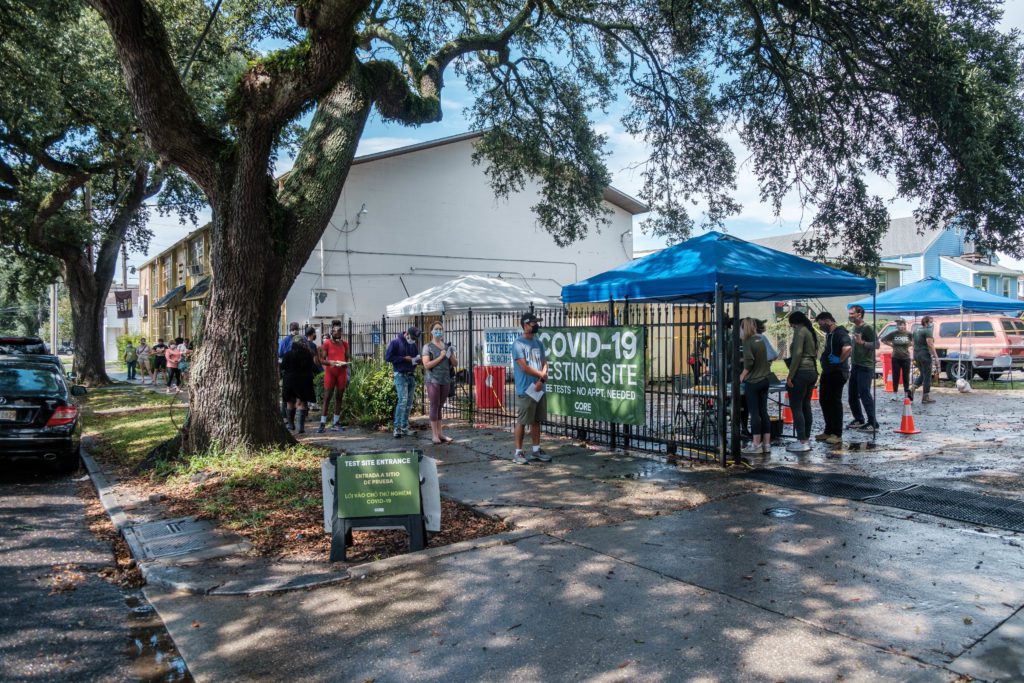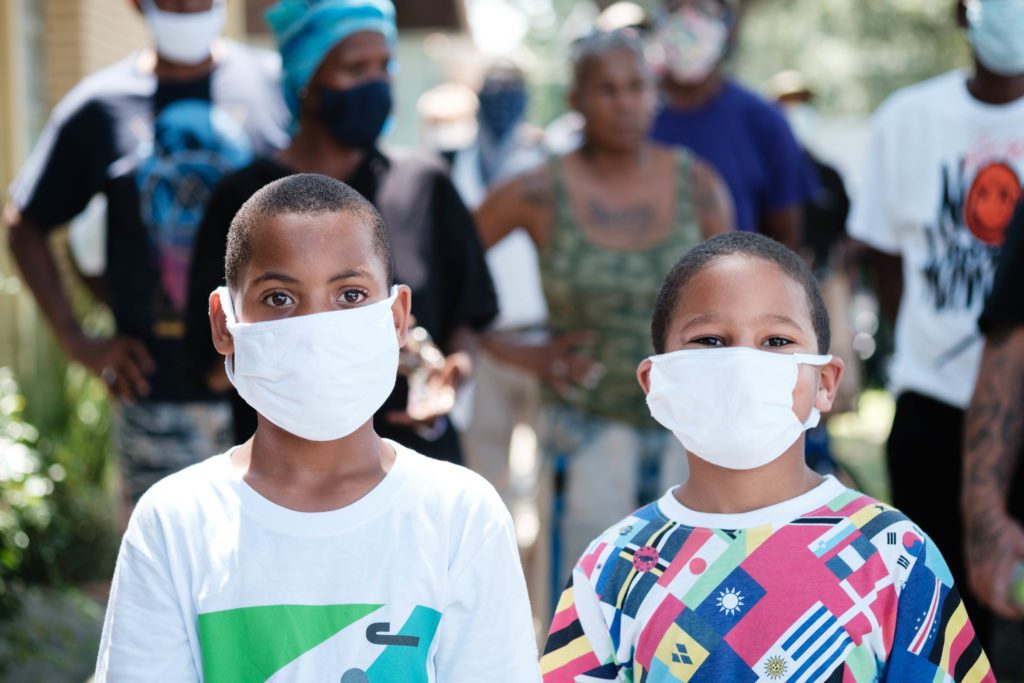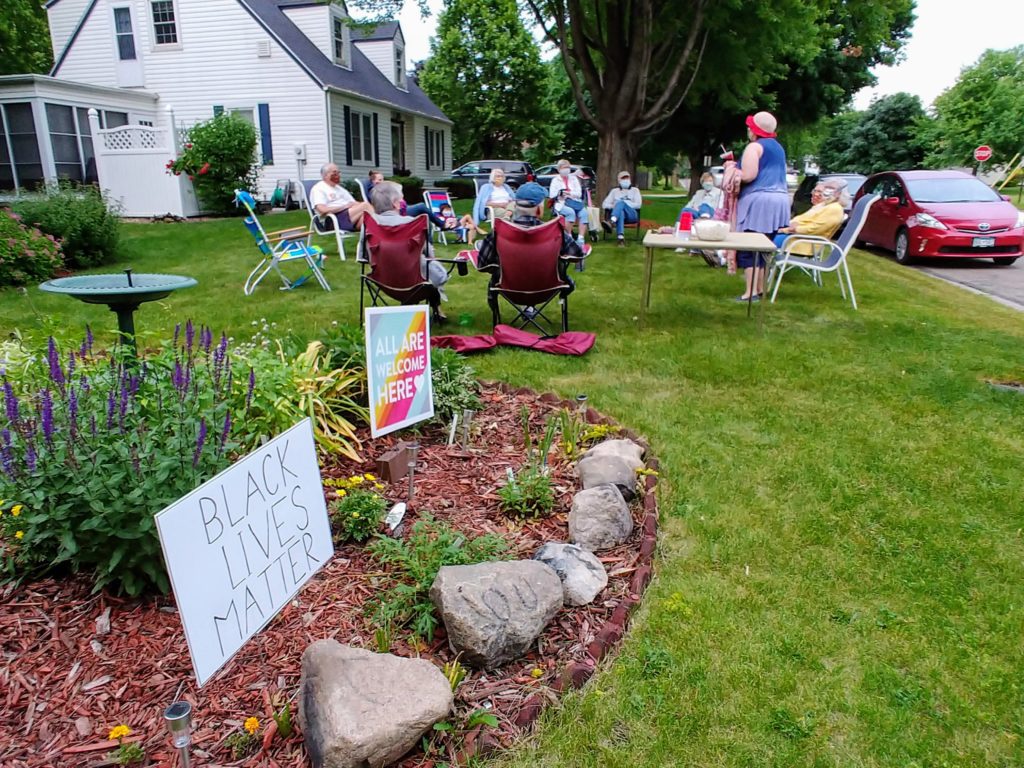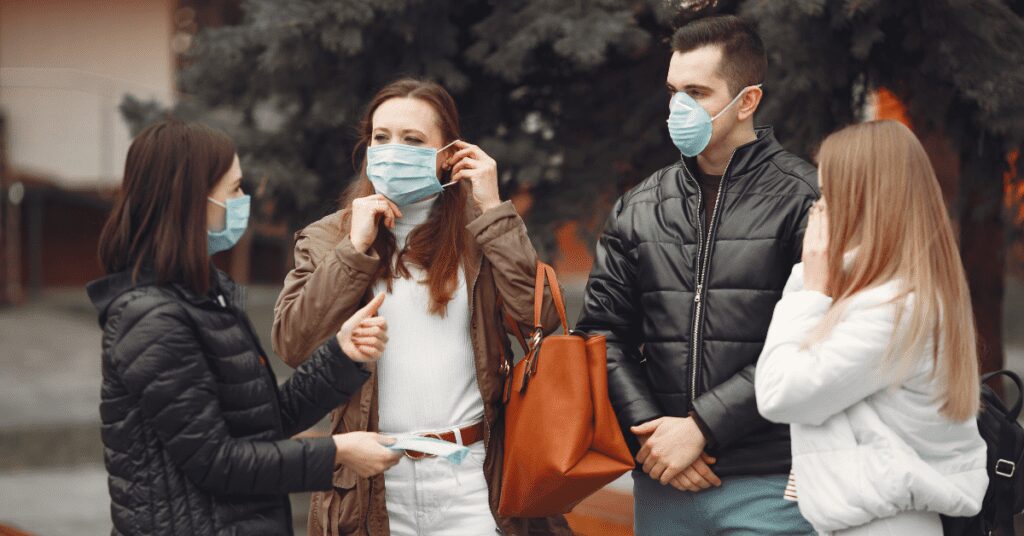By Kate H. Elliott
This post originally appeared in Story Magazine and is republished here with permission.
Pastors share their experiences counseling through the ugliness, uncertainty, and unexpected insights of 2020

As a way to serve its community, Bethlehem Lutheran Church was a host site for COVID-19 testing administered by the City of New Orleans Health Department.
A Louisiana pastor collaborates with an out-of-work chef to serve up 500 to-go plates of Thai barbecue ribs for neighbors, then writes a sermon between rounds of I Spy and “Daddy, can I have a snack?”
A Minnesota church provides laptops and study space for students to complete online assignments.
Kentucky parishioners talk with their pastor on Zoom after the Breonna Taylor shooting; one month later, they hammer a Black Lives Matter sign into the brick of their church building.
These stories represent a sea of pastoral experiences that reflect the trauma, hope, loneliness, holiness, uncertainty, resilience, and ugliness of 2020. None of these church leaders profess to have all the answers, yet they are digging deep to find inspiration and energy to counsel and comfort congregations, lift up communities, and navigate technology to do so. The specifics look different for each pastor and congregation, but their stories share themes: Worship methods are evolving, churches run best with an all-hands-on-deck approach, and Christians have an opportunity—if not an obligation—to drive compassionate curiosity, facilitate courageous conversations, and advocate for meaningful change.
Angela Denker ’13 M.Div. resists the ‘culture of contempt’
Transformation has begun, said Angela Denker, author of “Red State Christians,” and it may be the one gift of this time. All the ambiguity, isolation, and heightened social awareness are illuminating truths and opportunities for progress and innovation. They are too widespread for the church to ignore.
In late May, Denker wrapped a clerical collar around her neck on the way to a rally for justice and peace in Minneapolis, where George Floyd died after a police officer pressed a knee on his neck for nearly nine minutes. “I feel far more comfortable telling stories and starting conversations,” she said. “But this was in my backyard. I felt called to advocate for justice.”
She stuck a Black Lives Matter sign in her yard, then drove out through the cornfields to Grace Lutheran Church in Brownton, Minnesota, where she carries on a family tradition of pastoring rural Midwestern congregations. Denker said it is where she sees the Holy Spirit move through grounded conversations and meaningful relationships.
She continues that work through regular posts on her blog and global webinars or Washington Post articles that she fits into her schedule of lawn-chair worship and socially distanced Sunday school. The Minnesota native is working on her second book, about hope in America, after the 2020 election resurrected interest in her first book, “Red State Christians,” a collection of post-2016 election conversations with Christian supporters of President Donald Trump.
Throughout October, Luther Seminary’s Faith+Lead online community hosted Denker on a live webcast, “Finding Hope in a Divided Country: Election Edition.” She addressed how to have productive conversations in the midst of polarization without sacrificing the gospel’s call to mercy and justice. She continues to place her faith in the endurance of love and to work to help move us all past contempt and judgment toward understanding and unity.
Ben Groth serves neighbors, seeks peace
For 132 years, Bethlehem Lutheran Church has stood for justice and weathered storms by showing up for its members and its New Orleans neighborhood. Then COVID-19 hit.
“On March 1, we kicked off a weekly community lunch, and on March 15 we ceased in-person worship,” said Ben Groth, who has served as the church’s pastor since 2018. “We regrouped, and through a grant from Lutheran Disaster Response, we’ve been able to pass out to-go lunches each Wednesday and Sunday, about 500 each week.”
Groth reached out to De Wells, better known as “Chef De,” who previously cooked at Commander’s Palace, a New Orleans landmark. Bethlehem’s Community Table offers gourmet dining to-go that has brought the church closer to its neighbors.

“Over the summer, I did quite a few porch confirmations and ‘porch church’ as families invited me to their lawns, where I held a short service for them and sometimes their neighbors,” said Groth, a doctoral student of history at Tulane University.
The church also served as a COVID-19 testing site, where the City of New Orleans Health Department—in conjunction with Community Organized Relief Effort—administered about 500 tests.
“We’re doing what we can to address immediate needs, while not losing sight of the emotional and spiritual healing that needs to take place in the midst of so much darkness,” he said.
Groth has preached frequently on the Psalms to reiterate that the kingdom of God is here and now, he said. “They remind us we can both see and be the goodness of the Lord in the land of the living. It’s a reassuring message but also one that calls us to act and work toward progress and change.”
Rachel Small Stokes sees ‘signs’ of transformation
Rachel Small Stokes pastors Immanuel United Church of Christ in Louisville, Kentucky, whose church members agreed—via Zoom—to post a Black Lives Matter sign on church property.
“A church member said he would pay for the sign ‘as long as it’s big.’ The sign is 8 feet long and 5 feet tall,” she said. “It’s a sign our church created, together, and that process was one of the biggest movements of the Holy Spirit I’ve ever seen. It showed me I don’t have to create the vision but create the space for the vision to emerge.”
Congregants also created a phone tree to call each parishioner weekly and kicked off Zoom Bingo nights. The director of education created a series of socially distanced games the youth come together to play each week, and participation has never been more consistent. A lawyer couple in the congregation found a ministry through making homemade jam, which they place on congregants’ porches each week.
“It’s these moments of joy that remind us that we are expressions of God’s love,” she said. “It may be just the vision we need right now.”
DID YOU KNOW? Thousands of Christian leaders call on Faith+Lead, Luther Seminary’s online learning hub, to connect and discuss their experiences forming Christian community. Some individuals in this story first shared their ideas in a Faith+Lead discussion forum.
Glenn Monson ’91 M.Div. and Dan Forehand witness the evolution of worship
Glenn Monson never thought he’d spend so much time in a parking lot. But on any given Sunday, you’ll find him near the pavement outside of Mount Olive Lutheran Church in Rochester, Minnesota, where he serves as senior pastor. The audiovisual technician flips on the FM radio transmitter as parishioners set up lawn chairs alongside sedans or pull out their “Tupperware communion” from inside their minivans, radios turned up to hear the word. Monson also has led a luminary walk in the parking lot.
“COVID-19 has challenged us to innovate, and worship will never be the same,” Monson said. Mount Olive Lutheran also shares highly produced online services, which have “gone global”—a neighbor’s brother watches in Germany. Monson plans to replace its pre-COVID Saturday service with an online option that complements traditional Sunday worship.
“The online service has expanded our reach, and people appreciate the accessibility, which I know will seem like a good option as winter weather rolls in,” he said. “We’ve also come to appreciate hosting certain meetings and book studies online.”
One recent book study included a discussion about systemic racism. “Some people want to learn about and talk through issues of race, but they’re nervous to do so or don’t know where to start,” Monson said. “It’s my pastoral duty to find ways to meet congregants where they are and help them consider the gospel in the context of today.”
The church identifies solutions to problems facing the community. Several years ago, the congregation voted to serve as a site for affordable daycare, five days a week. During the pandemic, members of the congregation who work for IBM secured laptops and opened the doors of the church to provide access to technology for students needing to complete online assignments.
Dan Forehand of Grace Lutheran Church in Elkhart, Indiana, developed a solution for congregants who are tired of virtual gatherings. Each week, he works with parishioners to prepare a liturgy, links to hymns on YouTube, and adds the other parts of a service for groups of six to 10 members who meet in parks, backyards, or on the church lawn. These small groups pray, hear a sermon, and share updates about their communal service projects—like writing notes to community members or preparing care packages for first responders.
The church maintains its Facebook Live service at 9 a.m. and a drive-in service with communion at 11 a.m. each Sunday, but about two-thirds of the congregation is also involved in these small groups. The congregation, Forehand said, is committed to maintaining these groups after COVID-19 restrictions are lifted. “This was the model of the early church, and, I believe, is the direction for the ‘next normal’ of the church,” he added.
Coqui Conkey and Rebecca Zielke call congregants to live out the word
No matter the style, worship draws people of all perspectives together in faith. Coqui Conkey and Rebecca Zielke have focused their pandemic pastoring on helping their congregations learn to speak and listen to each other.

“The role of the church is to acknowledge differences and learn the grace of allowing the congregation and the broader church to be diverse,” said Conkey, who pastors Associated Church in Owatonna, Minnesota, which has started a midweek evening vesper and contemplative service around the church fire pit. “Real conversation means we can each be changed by it.”
When seeking to take a stand or act as a congregation, Conkey has found it helpful to create a shared decision-making process that involves questions like, “How does this help us live out our call as a congregation?”
Zielke, who serves Lord of Life Lutheran Church in Canfield, Ohio, feels that her weekly sermons are no match for the daily onslaught of social media messages.
Her lessons, focused on grace and forgiveness, have encouraged conversations for the purpose of understanding rather than shaming or convincing: “As those who benefit from God’s unearned mercy and forgiveness, we have no leg to stand on to justify us treating others any differently from the way God has dealt with us,” she challenged with a teaching from Matthew 18 via Facebook Live video.
Trish Reedstrom ’14 M.Div. on the power of prayer
Trish Reedstrom, pastor of Messiah Lutheran Church in North Mankato, Minnesota, addresses topics in a way that keeps people listening, regardless of their views. “If we can’t learn and talk about difficult issues at church, where can we do it? But we must practice,” she added. That practice comes in the form of small group studies, where parishioners feel comfortable wondering out loud without fear of retribution or anger. There is a lot of talk about grace-filled responses, she said.
She has plucked relevance from the Bible story of Jesus feeding the 5,000, as it addresses sufficiency instead of scarcity, and from the Canaanite woman in Matthew 15, which calls followers to see the “other” in a new way.
Reedstrom has seen God’s work through prayers of grief and gratitude, as parishioners open their hearts in frustration and hope. “Each week, we name [our grief], which diminishes its power but also helps us understand we are not alone,” she said.
Self-care for pastors in a divided, socially distant nation
Beverly Wallace, associate professor of congregation and community care at Luther Seminary, said healing work—both at the individual and communal levels—cannot wait until everything is fixed.
“We need each other at this time, and we need to recognize the trauma that is within us, as well as communal and generational trauma. We cannot fully love the other if we do not know the other, and that’s why we must listen,” Wallace said. “This might be an opportunity for us to explore more fully our relationship with God.”
Wallace encourages healing congregational practices in this time of social distance:
- Acknowledge and discuss the grief and loss parishioners are experiencing now and will experience even after community health restrictions are lifted.
- Engage in what Wallace calls “fearless dialogue”: Come together, talk about difficult and painful issues without fear of retribution or shame, and graciously listen to each other.
What about pastors who feel overwhelmed or depleted?
“This is an opportunity to practice self-compassion: holding ourselves with tenderness as we would hold those for whom we care,” said Carla Dahl, professor of congregational and community care leadership and George C. Weinman Chair of Pastoral Theology and Ministry at Luther Seminary. “Basic self-care—like nutrition, rest, movement, connection with trustworthy others, and grounding spiritual practices—must be a priority.”
Dahl suggested practices to keep pastors physically and mentally grounded:
- Squared breathing: Breathe in for four seconds and then exhale for four seconds, thinking about how the air feels as it fills your belly like a balloon and then how it feels as you push it out.
- Physical movement: Take a walk, do yoga, or find a fun way to move your body.
- 5-4-3-2-1 method: Use your senses to list five things you see, then four things you hear, three things you can touch from where you are sitting, two things you can smell, and one thing you can taste.

